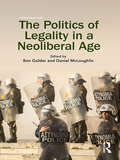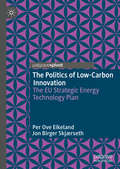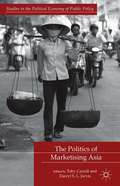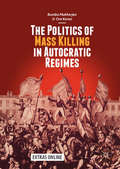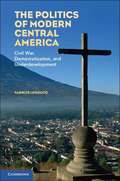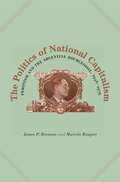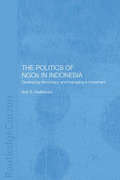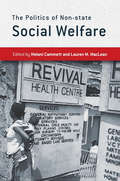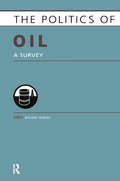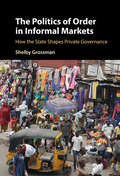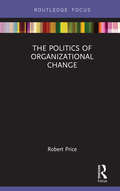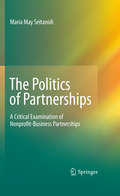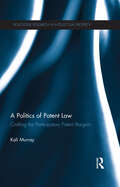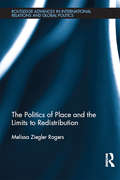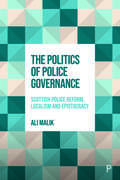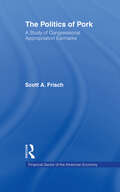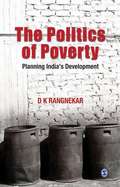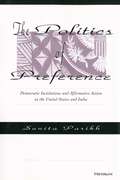- Table View
- List View
The Politics Of Latin American Development
by Gary W. WyniaThis popular introduction to Latin American politics probes behind the current events and reveals the fundamental economic and political dynamics shaping events and driving policy. Using the paradigm of politics as a game, domestic and foreign players are identified and the rules that govern their interaction are described. <P><P>This analytical framework is then used in detailed analyses of the strategies of development that have dominated Latin American politics. Chapters are devoted to democratic reform, military authoritarianism, and revolutionary politics with detailed examples from Argentina, Brazil, Chile, Cuba, Mexico, Nicaragua, Peru, and Venezuela. <P><P>This third edition brings all national cases up to date, analyzing the rise of democratic governance as well as the challenges presented by unprecedented foreign debts. Special attention is given to the restoration of constitutional democracy in Argentina and Brazil, and a systematic comparison of the movements in those countries is developed. More information and analysis on Cuba and Nicaragua are provided and emphasis is given to the 1988 election in Mexico. New material on the foreign debt crisis, the Roman Catholic Church, and the armed forces is also given.
The Politics of Legality in a Neoliberal Age
by Ben Golder Daniel McLoughlinThis volume addresses the relationship between law and neoliberalism. Assembling work from established and emerging legal scholars, political theorists, philosophers, historians, and sociologists from around the world – including the Americas, Australia, Europe, and the United Kingdom – it addresses the conceptual, legal, and political relationships between liberal legality and neoliberal economics. More specifically, the book analyses the role that legality plays in the dominant economic force of our time, offering both a legal corrective to scholarship in economics and political economy that has paid insufficient attention to legal ideas, and, at the same time, a political economic corrective to legal scholarship that has only recently turned to theorizing neoliberalism. It will be of enormous interest to those working at the intersection of law and politics in our neoliberal age.
The Politics of Leverage in International Relations
by H. Richard FrimanThis unique volume unpacks the concept and practice of naming and shaming by examining how governments, NGOs and international organisations attempt to change the behaviour of targeted actors through public exposure of violations of normative standards and legal commitments.
The Politics of Low-Carbon Innovation: The EU Strategic Energy Technology Plan
by Per Ove Eikeland Jon Birger Skjærseth"Although technological innovation is undoubtedly crucial for addressing climate change, low-carbon innovation policies and politics have hardly been studied. This book clearly reveals the promises and pitfalls of European efforts in this field – recommended reading!"—Sebastian Oberthür, Institute for European Studies, Belguim"This compact volume effectively addresses a surprisingly unknown territory in an otherwise well-explored landscape. In doing so, it will provide a useful resource to all who follow the uneven progress of climate and energy policy in the EU context, as well as those who are interested in policies to stimulate technology development more broadly."—Tim Rayner, Tyndall Centre for Climate Change Research, University of East Anglia, UKThe EU Strategic Energy Technology Plan (SET-Plan) was aimed at accelerating low-carbon innovation by raising, coordinating and concentrating resources to certain low-carbon technologies. At the ten-year anniversary of the SET-Plan, this book examines why it was adopted and what it has achieved. Using an analytical framework developed to capture the ‘politics of innovation’, the authors trace the history of the Plan from initiation to implementation, and then explain its development as seen from the perspectives of the EU institutions, member-states, industry, the research community and international technology markets. The concluding chapter discusses lessons and prospects for European low-carbon innovation towards 2030 and beyond. This new work fills a void in the literature on EU climate and energy policies, and will appeal to scholars, students and practitioners in these fields.
The Politics of Market Discipline in Latin America
by Daniela CampelloThe Politics of Market Discipline in Latin America uses a multi-method approach to challenge the conventional wisdom that financial markets impose broad and severe constraints over leftist economic policies in emerging market countries. It shows, rather, that in Latin America, this influence varies markedly among countries and over time, depending on cycles of currency booms and crises exogenous to policy making. Market discipline is strongest during periods of dollar scarcity, which, in low-savings commodity-exporting countries, occurs when commodity prices are high and international interest rates low. In periods of dollar abundance, when the opposite happens, the market's capacity to constrain leftist governments is very limited. Ultimately, Daniela Campello argues that financial integration should force the Left toward the center in economies less subject to these cycles, but not in those most vulnerable to them.
The Politics Of Marketising Asia
by Toby Carroll Darryl S.L. JarvisEconomic growth continues to transform the economic and political landscape of Asia. Equally the policies now being adopted to promote private sector participation, re-structure state entities, and reduce the presence of the state in the provision of public goods and services, are tied to fundamental transformations in Asia's state-society relations. The global cast of contributors present a timely analysis of the impact of neo-liberalism on Asia's developmental policies and the organisation of Asian states and markets. Ironically, the "developmental state" that has historically driven Asia's rapid economic transformation is now threatened by an increasingly dominant neoliberal agenda that aims to roll back the state in the name of market fundamentalism.
The Politics of Mass Killing in Autocratic Regimes
by Bumba Mukherjee Ore KorenThis book develops a detailed, disaggregated theoretical and empirical framework that explains variations in mass killing by authoritarian regimes globally, with a specific focus on Pakistan, Indonesia, and Malaysia. Using a combination of game-theoretic, statistical, and qualitative approaches, this project explicates when civilians within nondemocratic states will mobilize against the ruling elite, and when such mobilization will result in mass killing. In doing so, it illustrates the important role urbanization and food insecurity historically played, and will continue to play, in generating extreme forms of civilian victimization.
The Politics of Migrant Labour: Exit, Voice, and Social Reproduction
by Gabriella Alberti Devi SacchettoThe turnover of labour and its significance for workers and employers has usually been considered at the organizational level as individual exit behaviour, and seldom in relation to the cross-border mobility practices of migrant workers within and without the workplace. Drawing from labour process theory, the autonomy of migration, social reproduction, and industrial relations, this book explores the relationship between labour mobility and international migration under a global and historical perspective. Uncovering both the individual and collective actions by migrants inside and outside worker organizations, the authors develop a new understanding of migrants’ everyday mobilities as creative and life-sustaining strategies of social reproduction and labour conflict.
The Politics of Ministry: Navigating Power Dynamics and Negotiating Interests
by Steven Garber Bob Burns Tasha D. Chapman Donald C. GuthrieWe all need help navigating the politics of ministry. "Politics" is often considered a dirty word. It brings to mind lies and manipulation, accusations and scandals. But at its most basic level, politics is simply the everyday activity of getting things done with other people: understanding their interests, recognizing the power dynamics at play, and learning how to negotiate relationships and institutions to achieve a common goal. These realities are as true in ministry settings as anywhere else. In The Politics of Ministry, Bob Burns, Tasha Chapman, and Donald Guthrie combine their long ministry experience with sociological research on the topic. Filled with real-life stories taken from a variety of ministry settings, this book sets out wise principles and practices that help us see more clearly the political dynamics at play in our churches and parachurch ministries. All ministry is political. As servants of Christ's kingdom, we are called to navigate the politics of ministry with grace, wisdom, and charity. This book shows us how the gospel of Jesus changes the way we work with those around us toward our common goal.
The Politics of Modern Central America
by Fabrice Lehoucq"This book analyzes the origins and consequences of civil war in Central America. Fabrice Lehoucq explains why the inability of autocracies to reform led to the civil wars of the 1980s and why violent conflict led to the unexpected transition to non-military governments in the 1990s. He examines why economic stagnation throughout much of the region, along with unevenness of political reform, has limited democratization. This book also uses these developments to shed light on core debates in comparative politics, suggesting that more progress has been made in understanding the persistence of inequality than in identifying the causes of civil war"--
The Politics of Museums (New Directions in Cultural Policy Research)
by Clive GrayThis is the first book to examine how and why museums are political institutions. By concentrating on the ways in which power, ideology and legitimacy work at the international, national and local levels of the museum experience, Clive Gray provides an original analysis of who exercises power and how power is used in museums.
The Politics of National Capitalism: Peronism and the Argentine Bourgeoisie, 1946–1976 (G - Reference, Information and Interdisciplinary Subjects)
by Marcelo Rougier James P. BrennanIn mid-twentieth-century Latin America there was a strong consensus between Left and Right—Communists working under the directives of the Third International, nationalists within the military interested in fostering industrialization, and populists—about the need to break away from the colonial legacies of the past and to escape from the constraints of the international capitalist system. Even though they disagreed about the desired end state, Argentines of all political stripes could agree on the need for economic independence and national sovereignty, which would be brought about through the efforts of a national bourgeoisie. James Brennan and Marcelo Rougier aim to provide a political history of this national bourgeoisie in this book. Deploying an eclectic methodology combining aspects of the “new institutionalism,” the “new economic history,” Marxist political economy, and deep research in numerous, rarely consulted archives into what they dub the “new business history,” the authors offer the first thorough, empirically based history of the national bourgeoisie’s peak association, the Confederación General Económica (CGE), and of the Argentine bourgeoisie’s relationship with the state.They also investigate the relationship of the bourgeoisie to Perón and the Peronist movement by studying the history of one industrial sector, the metalworking industry, and two regional economies—one primarily industrial, Córdoba, and another mostly agrarian, Chaco—with some attention to a third, Tucumán, a cane-cultivating and sugar-refining region sharing some features of both. While spanning three decades, the book concentrates most on the years of Peronist government, 1946–55 and 1973–76.
The Politics of NGOs in Indonesia: Developing Democracy and Managing a Movement (Rethinking Southeast Asia)
by Bob S. HadiwinataThis book deals with two major issues: how Indonesian NGOs survived under Suharto's authoritarian rule; and how NGOs contributed to the promotion of democracy in the post-Suharto era. If NGOs are to change from 'development' to 'movement' in democratic post-Suharto Indonesia, they must adjust not only their management and working style, but also their very ideology. This comprehensive study will be an important book for scholars interested in Asian studies, Indonesian politics and development studies.
The Politics of Non-state Welfare
by Lauren M. Maclean Melani CammettAcross the world, welfare states are under challenge (or were never developed extensively in the first place) while non-state actors increasingly provide public goods and basic welfare. In many parts of the Middle East and South Asia, sectarian organizations and political parties supply basic services to ordinary people more extensively and effectively than governments. In sub-Saharan Africa, families struggle to pay hospital fees, and nongovernmental organizations (NGOs) launch welfare programs as states cut subsidies and social programs. Likewise, in parts of Latin America, international and domestic NGOs and, increasingly, private firms are key suppliers of social welfare in both urban and rural communities. Even in the United States, where the welfare state is far more developed, secular NGOs and faith-based organizations are critical components of social safety nets. Despite official entitlements to public welfare, citizens in Russia face increasing out-of-pocket expenses as they are effectively compelled to seek social services through the private market.In The Politics of Non-state Social Welfare, a multidisciplinary group of contributors use survey data analysis, spatial analysis, in-depth interviews, and ethnographic and archival research to explore the fundamental transformation of the relationship between states and citizens. The book highlights the political consequences of the non-state provision of social welfare, including the ramifications for equitable and sustainable access to social services, accountability for citizens, and state capacity. The authors do not assume that non-state providers will surpass the performance of weak, inefficient, or sometimes corrupt states but instead offer a systematic analysis of a wide spectrum of non-state actors in a variety of contexts around the world, including sectarian political parties, faith-based organizations, community-based organizations, family networks, informal brokers, and private firms.Contributors: Scott Allard, University of Chicago; Jennifer N. Brass, Indiana University; Melani Cammett, Brown University; Linda Cook, Brown University; Ian Gough, London School of Economics; Michael Jennings, School of Oriental and African Studies; Anirudh Krishna, Duke University; Pauline Jones Luong, University of Michigan; Lauren M. MacLean, Indiana University; Alejandra Mizala, University of Chile; Alison Post, University of California, Berkeley; Ben Ross Schneider, Massachusetts Institute of Technology.
Politics of Oil: A Survey
by Bülent GökayThis new title presents key information on the oil industry world-wide, and will be of interest to anyone involved in or studying the politics of oil production, processing and selling. Oil has long been at the forefront of political agendas, and with increased tensions in the Middle East, there has never been a greater need for up-to-date, reliable information on this key industry. Includes: * essays covering the main themes * an A-Z glossary listing important terms * detailed maps * a statistics section.
The Politics of Order in Informal Markets: How the State Shapes Private Governance (Cambridge Studies in Economics, Choice, and Society)
by Shelby GrossmanProperty rights are important for economic exchange, but many governments don't protect them. Private market organizations can fill this gap by providing an institutional structure to enforce agreements, but with this power comes the ability to extort group members. Under what circumstances, then, will private organizations provide a stable environment for economic activity? Based on market case studies and a representative survey of traders in Lagos, Nigeria, this book argues that threats from the government can force an association to behave in ways that promote trade. The findings challenge the conventional wisdom that private good governance in developing countries thrives when the government keeps its hands off private group affairs. Instead, the author argues, leaders among traders behave in ways that promote trade primarily because of the threat of government intrusion.
The Politics of Organizational Change (Routledge Focus on Business and Management)
by Robert PricePolitics is an aspect of everyday life within organizations, and is a force that inhibits individual and collective behaviour. If not fully understood, it can impede organizational change and development. In order to minimise the political aspects of organizational dynamics there is a need to understand the extent to which organizational culture brings about politicised conformance and how individuals shape their behaviour through self-interest to conform—sense-giving and sense-making nexus—thus moderating the degree of change initiatives. The Politics of Organizational Change explores the relationship between self-interest, power, politics and managing organizational change from a theoretical perspective. It encourages the fundamental questioning of the relationship between self-interest, power and control inherent within organizational change, and discusses the attendant implications for managing change. It will be of value to those who require a text that goes beyond set patterns of coverage found in textbooks dealing with managing change.
The Politics of Partnerships: A Critical Examination of Nonprofit-Business Partnerships
by Maria May SeitanidiThe widespread partnering phenomenon in the US and the UK spurred a significant amount of literature focusing on its strategic use. The Politics of Partnerships diverges by examining if partnerships can deliver benefits that extend beyond the organisational to the societal level resulting from the intentional combined efforts of the partners.
A Politics of Patent Law: Crafting the Participatory Patent Bargain (Routledge Research in Intellectual Property)
by Kali MurrayThere has been much written on the impact of international treaties like the Trade Related Aspects on Intellectual Property (TRIPS), which laments the failure of patent systems to respond to the interests of a diverse set of non-profit, public interest, and non-corporate entities. This book examines how patent law can accommodate what James Boyle terms a "politics", that is, "a conceptual map of issues, a rough working model of costs and benefits, and a functioning coalition-politics of groups unified by common interests perceived in apparently diverse situations". A Politics of Patent Law provides a substantive account of the ways in which various types of participatory mechanisms currently operate in patent law, and examines how these participatory mechanisms can be further developed, particularly within a regional and international context. In exploring this, Murray highlights the emergence of constitutional law in international intellectual property law as being at the centre of the patent bargain and goes so far as to argue that the constitutional tradition in intellectual property law is as important as TRIPS. Ultimately, the book sets forth a "tool-box" of participatory mechanisms which would allow for, and foster third party participation in the patent process. This book will be of particular interest to academics, students and practitioners in the field of IP Law.
The Politics of Place and the Limits of Redistribution (Routledge Advances in International Relations and Global Politics)
by Melissa Ziegler RogersNumerous scholars have noticed that certain political institutions, including federalism, majoritarian electoral systems, and presidentialism, are linked to lower levels of income redistribution. This book offers a political geography explanation for those observed patterns. Each of these institutions is strongly shaped by geography and provides incentives for politicians to target their appeals and government resources to localities. Territorialized institutions also shape citizens’ preferences in ways that can undermine the national coalition in favor of redistribution. Moreover, territorial institutions increase the number of veto points in which anti-redistributive actors can constrain reform efforts. These theoretical connections between the politics of place and redistributive outcomes are explored in theory, empirical analysis, and case studies of the USA, Germany, and Argentina.
The Politics of Police Governance: Scottish Police Reform, Localism, and Epistocracy
by Ali MalikMaking a unique contribution to the scholarship on democratic policing, this book adapts the concept of epistocracy to explore the role of knowledge and expertise in police governance and accountability. Analysing the Scottish police governance arrangements following reform in 2013, the book provides a framework for knowledge-based working practices, showing how the principles of democratic policing may be achieved in practice.
The Politics of Pork: A Study of Congressional Appropriations Earmarks (Financial Sector of the American Economy)
by Scott A. FrischThis study develops a new way of studying pork barrel politics based on congressional behavior in the 1980s and 1990s.
The Politics of Poverty
by D K RangnekarDr D. K. Rangnekar was a leading public intellectual who marked his presence as the editor of the Economic Times and later the Business Standard. This collection brings together a discerning selection of his writings that are organized across four themes: social and political dimensions of development; international context to India's experiment; planning and budgets; and industrial and economic policy. The writings begin in the early 1960s and end in 1984--at the cusp of radical transformation of India's economic policies and political fabric--thus providing an important handbook of the times. The collection includes reflections on PL480 and the accompanying devaluation; the 1970s call for a New International Economic Order and the problems of development in an unequal world; and G77 solidarity and the Uruguay Round of negotiations of GATT. Drawing on Dr Rangnekar's expertise in planning, budgets, and black money, the collection includes his commentaries on the transition from Nehruism and planned development to the difficult foundations of India's contemporary economic performance. The selection is accompanied by essays from T.N. Ninan, Pratap Bhanu Mehta and Sanjaya Baru.
The Politics of Preference: Democratic Institutions and Affirmative Action in the United States and India
by Sunita ParikhSunita Parikh examines the history and fate of affirmative action programs in two ethnically heterogeneous democracies, the United States and India. Affirmative action programs in the United States represent a controversial policy about which the American public feel at best ambivalence and at worst hostility, while in India the expansion of reservation policies in recent years has led to riots and contributed to the fall of governments. And yet these policies were not particularly controversial when they were introduced. How the policy traveled from these auspicious beginnings to its current predicament can best be understood, according to Parikh, by exploring the changing political conditions under which it was introduced, expanded, and then challenged. Although they are in many respects very different countries, India and the United States are important countries in which to study the implementation of ascriptive policies like affirmative action, according to Parikh. They are both large, heterogeneous societies with democratic political systems in which previously excluded groups were granted benefits by the majorities that had historically oppressed them. Parikh argues that these policies were the product of democratic politics--which required political parties to mobilize existing groups as voters--and the ethnically heterogeneous nature of Indian and U. S. society--where ethnic markers are particularly salient sources of identification as groups. Affirmative action in both countries was introduced because it could be used to solidify and expand electoral coalitions by giving benefits to defined minority groups, according to Parikh. As the policy became better known, it became more disliked by non-targeted groups, and it was no longer an appeal which was cost free for politicians. This book will be of interest to social scientists concerned with race and ethnic relations and with the comparative study of political and social systems. Sunita Parikh is Assistant Professor of Political Science, Columbia University.
The Politics of Private Security
by Adam WhiteThis is the first in-depth conceptual and empirical analysis of the political issues, processes and themes associated with private security provision and its growth in the postwar era, examining why private security has become so prominent, what its relationship to the state is and how it can be controlled.

